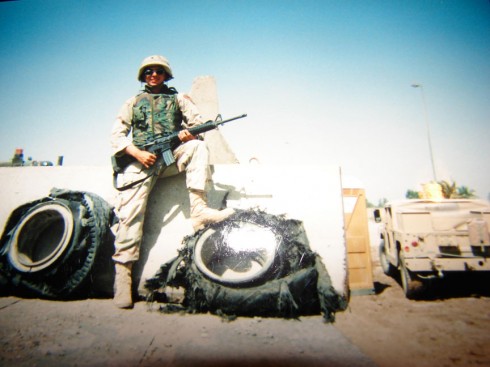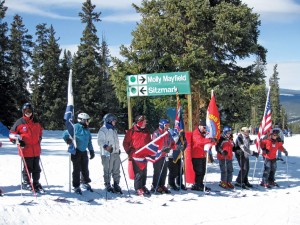Editor’s note: I first met Nick Morgan last summer in the San Luis Valley while he was living in Salida. I was curious to learn about his experiences as a returning Iraqi war veteran and was somewhat taken aback, but not entirely surprised by some of his stories. Since we first met he is now a student at CU Boulder. Initially I had planned to write an article based on his responses to the interview questions, but found his own words so compelling I decided to let him speak for himself. – M.R.
When did you enlist and which branch?
I enlisted in April of 2002 in the Army Reserves.
How old where you?
I was eighteen. It was right before I graduated high school.

Why did you enlist?
I enlisted because I wanted to get some financial help with college. Also, I wanted to serve … it wasn’t long after 9-11 and there was a lot of patriotism in the air. However, I never really thought about enlisting until after a recruiter contacted me.
Where and when did you serve overseas, and for how long?
I served in Baghdad, Iraq from February 2004 through February 2005.
What was your training/area of specialization?
I was an engineer, a heavy equipment operator. I was licensed in everything from bulldozers and road graders to tractor trailers and dump trucks. I also had combat engineer training and was combat life saver (CLS) qualified. I was initially in a multi-role bridge building company, although I was involuntarily transferred to a light combat corps-wheeled engineer battalion for deployment.
What type of operations were you involved with?
In Iraq, my unit fell under the 1st Cavalry Division and we were stationed near Baghdad International Airport (BIAP). We largely participated in force protection operations. Our main missions were Task Force Iron Claw, or as we so literally dubbed it, IED hunting. This mission was to find the roadside bombs you always hear about on the news. We also built several checkpoints, berms and barricades. My platoon was often tasked out to support Cavalry Scouts and Marines who wanted the playing field quite literally leveled.
Did you have unfettered access to general news (i.e. the media) via, internet? Television? Radio? Newspapers, etc?
When I was there in ‘04 a lot of the present infrastructure did not exist. Internet access early on was always challenging. Later we had a slightly more reliable internet cafe. A few of the tactical operation centers (TOCs) and headquarters had television, although it was not highly accessible either. As far as other sources of news, we largely depended on Armed Forces radio and newspapers … everything else from the outside news world was sent from home. That is, unless you consider Maxim and FHM magazines quality news sources. We always had access to those. Saying all this to say, we were generally sheltered, even in regard to our broader mission.
When did you return?
I returned to Ft. McCoy, Wisconsin in Feb. ‘05 after our year-long deployment had ended.
How soon after did you join the Iraq Veterans Against the War (IVAW) and why? Are you still a member?
I was separated from the reserves in July of 2006. I joined IVAW in 2007. I joined because I knew in my heart that everything about the invasion and occupation of Iraq was wrong. I needed an outlet to articulate what I was feeling and to engulf myself in individuals who have similar feelings and experiences. It was time to stand up, speak out, and educate the public on the inherent atrocities of war.
While I was on deployment, I and my fellow soldiers had a lot of questions about what our overarching mission was in Iraq. As engineers, we were under the impression that we were there to rebuild and keep the peace. This never happened. In fact, the only things we built were checkpoints and various types of force protection for American military personnel. We did, however, cause a lot of destruction and damage along the way. My participation in this caused me to want to do everything I could to put an end to the illegal and immoral Iraq War.
I am technically still a member, but I have not been actively organizing for a couple years now.
Do you know other vets here who are not members? Do they generally have a position on the wars?
I know plenty of them. Veterans are a very diverse group of folks so you could imagine that there are a lot of varying opinions. Everyone who served in Iraq had his or her own experience and an individual reaction to that experience. Generally speaking, I feel like the sentiment is that the Iraq war was a fight that very few people really had anything to gain from fighting. It is no secret that an extreme amount of war appropriations were given to private contractors through no-bid government contracts. This doesn’t really sit well with most people who have actually put their lives on the line at the whim of their government and military leadership. That said, many troops were and are still in for financial reasons. Others just blindly followed orders regardless of what the underlying intentions were. Some support it in that nobody wants to make such a sacrifice for no good reason. Many had an eager trigger finger when their boots hit the ground, yet returned home terrified at what they had experienced.
Tell us about some of your experiences since returning.
I was a full-time student when I got deployed. It was Veterans’ Day of 2003 when I received my deployment orders. Upon returning, I found it very difficult to relate to my peers in school. After a couple years in and out of school, trying to deal with what I had just experienced, I began organizing with IVAW. I turned 21 while I was in Iraq and was coming to terms with my rapidly waning youth. In 2008, I was diagnosed with severe and chronic post traumatic stress disorder (PTSD) by the Veterans’ Administration (VA).
Also in 2008, I attended a demonstration in my desert camouflage uniform (DCUs) at the final presidential debate between then Senators McCain and Obama. It had been a big year for the anti-war movement as Winter Soldier had taken place that March and IVAW had successfully marched on the Democratic National Convention in Denver. With this momentum, IVAW attempted to have a question pertaining to veterans’ rights and health care read at the presidential debate. To make a long story short, the cops wanted to get all of the demonstrators to move from the street to the sidewalk. Once we had squeezed onto the limited space of the sidewalk, the cops made a move to engage the crowd more physically than they already had been. I was thrown on my back by a cop in riot gear under the hoof of a horse, with a mounted officer sitting on his back. The horses hoof crushed my orbital and cheekbone. I also had a broken nose, severely bruised ribs, a massive knot on the left rear of my head, and a pretty serious concussion to boot. Since this incident, I have had two surgeries and a challenging recovery otherwise. It wasn’t easy surviving Iraq to come home and demonstrate my constitutional rights to have them literally stomped on by an organization that exists to serve and protect its citizens.
In 2009, I came to Colorado to get away from the bustle of the East Coast and to work with Veterans Green Jobs, a non-profit based in Denver. I participated in various projects with VGJ, including home energy auditing, back-country trail maintenance, fire mitigation, and rebuilding a historic log cabin. I have since returned to academia to finish my undergrad. I have actually taken this semester off to go to N.Y. for my trial against Nassau County et al. to hold them accountable for their actions in 2008.
Do you believe you have good health care available to you as a veteran?
This is kind of a loaded question. If a veteran is within a five-year time period of returning from a combat zone, he or she is eligible to receive free health care at the VA. Also, if a veteran has a certain percentage of service-connected disability, he or she has full access to VA health care (excluding dental). I feel like there is a vast disconnect between the VA and the support that veterans need coming home. Particularly, I’m talking about the eye-opening statistics regarding veteran/active duty suicide rates. The VA estimates this number to be 18 per week. So there is obviously something missing when veterans approach the VA for mental health support and are forced to wait for a response and turn to harming themselves. It took four months for me to even get a response when I requested mental health support from the VA. I can also remember a day in D.C. when I went to the ER at the VA where I waited for ten hours to not be seen until the next day. Ultimately, I think that health care at the VA is improving but has a long way to go before it adequately provides care for returning veterans.
Your thoughts about the job market for returning vets?
If you look at any demographic, the unemployment rate is significantly higher for vets in contrast with their civilian counterparts. These stats are particularly striking for veteran minority populations. This makes sense considering the amount of trauma many of us experienced. It’s difficult to return to civilian life after such an intense experience as combat. Plus, what does an infantryman do as a civilian if not work as a government contractor?
Overall thoughts on the mission in Iraq? On the current US role in the Middle East?
Even if there were a justification for the U.S. to invade Iraq, it was organized in poor fashion from the beginning (see Paul Bremer and the resignation of Gen. Shinseki). War will always bring out the worst in people. We have a tendency in this country to prop up ‘war heros’ and easily overlook what it means what it means to kill people over transient causes. In my opinion, there was not a single action that an American has done in Iraq that preserved the freedom and security of Americans at home. In fact, the opposite has been the case. Let’s consider the overwhelming strain on the U.S. military after multiple extended deployments for the last decade plus. Let’s also consider the massive DOD budget being pissed away in the Middle East when we are in desperate need of infrastructure and domestic programs that create quality jobs. I mean, imagine the financial surplus we would have if Obama wasn’t spending so much money on predator drones and the bombing of more Middle Eastern countries than Bush did. It’s time to pull out entirely. We have no business intervening in foreign affairs when we are willing to kill and displace millions of individuals over oil to fulfill our frivolous fossil fuel addiction. g
For more information:
Iraq Veterans Against the War: www.ivaw.org
Veterans Green Jobs: www.veteransgreenjobs.org
The U.S. Department of Veterans Affairs:
Coalition for Veterans:
www.coalitionforveterans.org/ciav/home/



